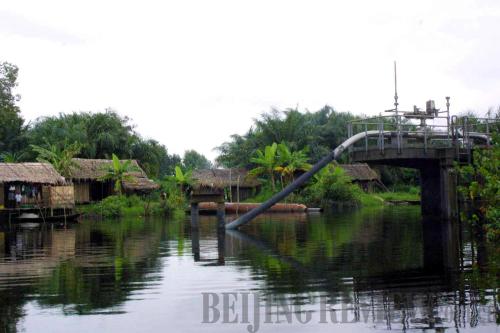|
 |
|
RIVER OF DARKNESS: The Niger River lies polluted with oil near the Niger Delta. Pipelines are frequently damaged by tribal militias who complain of not benefiting from the oil wealth (XINHUA) |
Offshore oil is the next frontier for energy corporations such as Shell and BP eager to lock up oil deposits in the name of development, national security and profits.
But as BP's Gulf of Mexico disaster - gushing 50,000 barrels per day (bpd) illustrates, massive offshore deposits can be as much a blessing as a curse, depending on how it is exploited, and the corporations doing the exploiting.
But as the Gulf of Mexico's environmental crisis - allegedly covering 40 percent of the Gulf's surface, made headlines, resulting in the rating agency Fitch slashing BP's value by six notches, "two steps above junk-value," Nigeria too was awash with a similar reality, one that went largely unreported.
Delta blues
This occurred when ExxonMobil subsidiary Mobil Producing Nigeria (MPN) - Nigeria's second largest producer, and the only major company to operate wholly offshore, discharged an estimated 100,000 bpd for more than seven days in May from Qua Iboe fields before the leak was halted.
"Over the years, we have been having oil spills from ExxonMobil facilities impacting negatively on our environment. Mobil has been so insensitive to the extent that they have refused to pay adequate compensation over the years,'' said Etang Edet Umoyo, a former Senator from the oil spill affected community representing Akwa Ibom South.
"We expect the Nigerian Government to take a cue from the U.S. Government's response to the Gulf of Mexico incident by instituting criminal charges against individuals and businesses that have destroyed local livelihoods and compel them to pay for what it would cost to restore the ecosystem," said Nnimmo Bassey, the Nigerian head of Friends of the Earth International (FoE).
About 95 percent of Nigeria's concessions are joint ventures between the state-owned Nigerian National Petroleum Corp. (NNPC) and energy multinationals such as Shell and MPN. The latter, for instance, operates an 800,000 acre concession comprised of 90 offshore platforms in a 40:60 joint venture with the NNPC.
"We also raised the issue of the oil company playing one community off against another, particularly playing Ibeno Local Government against the rest of us," he said.
"Fortunately, Ibeno community as far back as 1951 had been conducting its affairs as one community with us, but since Mobil arrived, they have tried to put a wedge against us," added Bassey.
Black holes
The spill marks a continuous pattern of pollution in Nigeria, the world's eighth largest oil producer, supplying 40 percent of the U.S. imports annually. Production, pegged at 2 million bpd last year, is intimately intertwined with systematic oil and gas pollution: Since the late 1970s, more than 6,000 oil spills have been documented with 2,000 major spill sites. While sites require remediation, the process generally consists of turning soil over in the oil-rich socio-ecologically devastated Niger Delta.
According to the Nigerian Conservation Foundation, 1.5 million tons of oil has been spilt in the Delta, the equivalent of a 1989 Alaska Exxon-Valdez every year, with ecological degradation caused by oil conservatively estimated at $5 billion annually. Meanwhile, more than 1,000 spills have been documented against energy multinational Shell, a corporation operating in over 100 countries. Despite Shell's legal citizen status in many developing countries, it is in Nigeria that over 40 percent of spills have occured.
Though Shell, Nigeria's largest oil producer, claims that "98 percent" of spills remain the product of vandalism and other forms of non-corporate activities, little investigation is conducted into the activities of multinationals.
Meanwhile, flaring of 40-60 percent associated gas (AG), estimated at 23 million cubic meters economically valued at more than $2 billion annually, continues largely unchecked, despite the fact that flaring (unwanted natural gas that is disposed of by burning) was outlawed - as section three of Nigeria's Associated Gas Re-Injection Act, in 1984.
Even as Shell declared $3 billion in investment designed to achieve, "a target to eliminate continuous flaring at our Nigerian operations by the end of 2008," a New York Times article revealed in 2004 that, "A high-level (Shell) review in December found that many oil field projects did not include plans to gather natural gas."
Yet both the government and the NNPC has been slow to respond, a situation that is not difficult to infer given that 80 percent minimum of the state budget is generated from oil revenue. Moreover, more than $400 billion in oil revenue has been siphoned from the country, according to the Financial Commission, between the period of 1960-99.
"It is even more disheartening that in addressing this ecological disaster, our own government decided to hide behind closed doors and allowed itself to take the unprecedented step of barring the press from being part of the resolution of an issue which affects us all," said Bassey.
|